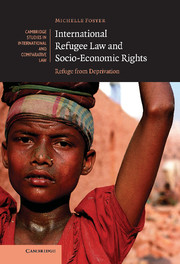Book contents
- Frontmatter
- Contents
- Acknowledgements
- Table of cases
- Table of treaties and other international instruments
- List of abbreviations
- 1 Introduction
- 2 A human rights framework for interpreting the refugee convention
- 3 Persecution and socio-economic deprivation in refugee law
- 4 Rethinking the conceptual approach to socio-economic claims
- 5 Economic deprivation as the reason for being persecuted
- 6 Economic disadvantage and the Refugee Convention grounds
- 7 Conclusions
- Bibliography
- Index
- CAMBRIDGE STUDIES IN INTERNATIONAL AND COMPARATIVE LAW
6 - Economic disadvantage and the Refugee Convention grounds
Published online by Cambridge University Press: 21 July 2009
- Frontmatter
- Contents
- Acknowledgements
- Table of cases
- Table of treaties and other international instruments
- List of abbreviations
- 1 Introduction
- 2 A human rights framework for interpreting the refugee convention
- 3 Persecution and socio-economic deprivation in refugee law
- 4 Rethinking the conceptual approach to socio-economic claims
- 5 Economic deprivation as the reason for being persecuted
- 6 Economic disadvantage and the Refugee Convention grounds
- 7 Conclusions
- Bibliography
- Index
- CAMBRIDGE STUDIES IN INTERNATIONAL AND COMPARATIVE LAW
Summary
Introduction
Chapter 5 focused on the various ways in which the ‘for reasons of’ clause, which requires the applicant to link his/her relevant ‘well-founded fear of being persecuted’ to a Convention ground, raises difficulties for refugee claims based on socio-economic deprivation. It focused on the nature of that causal link, and the particular challenges involved in establishing the causal link in the context of economic claims. This chapter now turns to consider the second aspect of the requirement to establish a link to a Convention ground: the correct interpretation of those grounds as relevant to economic-related claims.
As explained in the previous chapter, it is necessary for an applicant to establish that his or her fear of being persecuted is for reasons of his or her race, nationality, religion, political opinion or membership of a particular social group. All of these grounds are potentially relevant to claims based on economic deprivation, as has been made clear throughout this book. Numerous examples have been provided of cases where economic persecution is inflicted on the basis of race (for example, the Roma cases), religion (for example, the Sabean cases) and political opinion (for example, the cases involving land disputes which are properly understood as involving a political element). Claims based on socio-economic deprivation may also be made on the basis of nationality, and a number of recent cases in different jurisdictions have concerned claims by non-nationals who face serious socio-economic deprivation by virtue of their non-citizenship status.
- Type
- Chapter
- Information
- International Refugee Law and Socio-Economic RightsRefuge from Deprivation, pp. 291 - 340Publisher: Cambridge University PressPrint publication year: 2007



